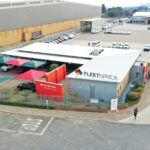Declining EU performance spells trouble for SA
Declining EU performance spells trouble for SA
Declining growth prospects across the Eurozone – exacerbated by the Russian invasion of Ukraine and continued global supply chain stickiness – spell decreased economic activity and vitality for South Africa, reveals CHRIS HATTINGH.
Along with China, the EU is one of South Africa’s biggest trading partners, especially in terms of raw materials and fresh produce. As consumers in EU countries are squeezed, so will their need for South African materials and goods decline.
A deteriorating economic outlook and heightened concerns regarding hot inflation are likely to top the announcements following the latest EU Executive Commission meeting on 14 July. In May, the Commission cut its growth forecast from 4 to 2,7% for this year, and to 2,3% for 2023. Inflation was estimated to be 6,1% in May, up from the previously estimated 3,5%. During the week of 4 July, Germany reported its first monthly trade deficit in 31 years. The country’s oil and gas bills are surging – a problem exacerbated by the amounts it imports.
European Central Bank Governing Council member Robert Holzmann recently stated that, if the inflation outlook for the EU doesn’t improve, the Bank should increase interest rates by as much as 125 basis points by September. If the Bank follows this route, it will mark a serious break from the generally gradual rate hikes of the last six months. Expected gas shortages (and by extension higher prices) will add further pressure on European consumers and businesses as they head into the colder months.
Stricter lockdowns in China throughout the first half of 2022 have depressed demand for South African commodities. While it looked as though the country might open up, higher cases in Shanghai especially could mean stricter measures once again. Shanghai reported 59 infections for 11 July – the fourth day in a row of higher case numbers. And whether or not the Chinese government ultimately decides to impose new restrictions on movement and business operations, the uncertainty caused by its commitment to “zero-Covid” will steadily limit economic activity in the long run.
Tighter economic conditions in both the Eurozone and China spell serious trouble for South African exporters and the state fiscus. Alongside these potentially declining appetites for South African materials from the Eurozone and China, the South African government is doing the economy no favours by refusing to allow serious private sector investment and upskilling in the country’s ports and rail networks. According to GAIN Group, the country is losing as much as R50 billion a year as a result of the costs involved in transporting goods via road alone; costs would be much lower if only rail could be used.
At present, the only “reform” that has been pushed by Transnet has been to open 16 rail slots to private companies. However, Transnet will remain the custodian of infrastructure, even after private capital has been invested. It is difficult to imagine that serious capital formation will take place with such caveats in place. South Africa cannot generate substantial economic growth on its own, and it cannot do so without reforms that allow it to free up trade spaces for substantial investment. The more barriers there are to investment, the harder potential investors will work to find other countries. South Africa can only set itself on a better footing with which to weather future storms if it becomes a better environment for trade.
South African companies and exporters with serious commitments in Europe have likely already started exploring alternative routes for getting their materials and goods out of the region (possibly through Namibia and the port at Maputo). Businesses and factories overseas will not wait forever to receive the necessary raw materials and the simple variable of time spent in port could persuade these businesses to find other ways to fulfil their needs.
Repeated blockades of highways in South Africa will also add costs for mining companies and farmers, making their operations more difficult and ensuring that their margins are even tighter. Those businesses that have not yet done so should pursue this shift as a matter of urgency. Because government’s ideological commitments do not allow it to pursue real reforms with the necessary speed, the alternative will be to lose out on any continued commodities boom and desire for South African materials.
Published by
Chris Hattingh
focusmagsa




